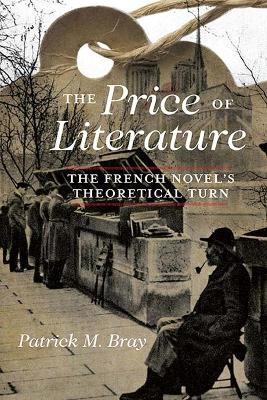
The Price of Literature
The French Novel's Theoretical Turn
Seiten
2019
Northwestern University Press (Verlag)
978-0-8101-3932-9 (ISBN)
Northwestern University Press (Verlag)
978-0-8101-3932-9 (ISBN)
Examines the presence of theory in the nineteenth-century French novel. Emerging after the French Revolution, what we call literature was conceived as an art liberated from representational constraints. Patrick Bray shows how literature's freedom to represent anything has meant, paradoxically, that it cannot articulate a coherent theory of itself.
The Price of Literature examines the presence of theory in the nineteenth-century French novel, something Proust likened to leaving a price tag on a gift. Emerging after the French Revolution, what we now call literature was conceived as an art liberated from representational constraints. Patrick M. Bray shows how literature's freedom to represent anything at all has meant, paradoxically, that it cannot articulate a coherent theory of itself—unless this theory is a necessarily subversive literary representation, or “the novel's theoretical turn.”
Literary thought, or the theory produced by the text, can only function by exploring what escapes dominant representations. The Price of Literature analyzes how certain iconic texts from the nineteenth century (by Mme de Staël, Hugo, Balzac, Flaubert, and Proust) perform a theoretical turn to claim the freedom to represent anything in the world, but also literature's ability to transform the world it represents. The conclusion, “Distributions of Literature,” advances a new way of thinking about literary scholarship—one based on how literature redistributes ways of writing by lending form to thought.
The Price of Literature examines the presence of theory in the nineteenth-century French novel, something Proust likened to leaving a price tag on a gift. Emerging after the French Revolution, what we now call literature was conceived as an art liberated from representational constraints. Patrick M. Bray shows how literature's freedom to represent anything at all has meant, paradoxically, that it cannot articulate a coherent theory of itself—unless this theory is a necessarily subversive literary representation, or “the novel's theoretical turn.”
Literary thought, or the theory produced by the text, can only function by exploring what escapes dominant representations. The Price of Literature analyzes how certain iconic texts from the nineteenth century (by Mme de Staël, Hugo, Balzac, Flaubert, and Proust) perform a theoretical turn to claim the freedom to represent anything in the world, but also literature's ability to transform the world it represents. The conclusion, “Distributions of Literature,” advances a new way of thinking about literary scholarship—one based on how literature redistributes ways of writing by lending form to thought.
Patrick Bray teaches in the Department of French in the School of European Languages, Culture & Society at University College London. Until recently he was Professor of French at the Ohio State University. He is the author of The Novel Map: Space and Subjectivity in 19th Century French Fiction. He is Editor-in-Chief of H-France Salon.
| Erscheinungsdatum | 30.04.2019 |
|---|---|
| Verlagsort | Evanston |
| Sprache | englisch |
| Maße | 149 x 226 mm |
| Gewicht | 245 g |
| Themenwelt | Geisteswissenschaften ► Sprach- / Literaturwissenschaft ► Anglistik / Amerikanistik |
| Geisteswissenschaften ► Sprach- / Literaturwissenschaft ► Literaturgeschichte | |
| Geisteswissenschaften ► Sprach- / Literaturwissenschaft ► Literaturwissenschaft | |
| Geisteswissenschaften ► Sprach- / Literaturwissenschaft ► Romanistik | |
| ISBN-10 | 0-8101-3932-4 / 0810139324 |
| ISBN-13 | 978-0-8101-3932-9 / 9780810139329 |
| Zustand | Neuware |
| Haben Sie eine Frage zum Produkt? |
Mehr entdecken
aus dem Bereich
aus dem Bereich
Poetik eines sozialen Urteils
Buch | Hardcover (2023)
De Gruyter (Verlag)
CHF 83,90
Buch | Softcover (2024)
belleville (Verlag)
CHF 27,95


